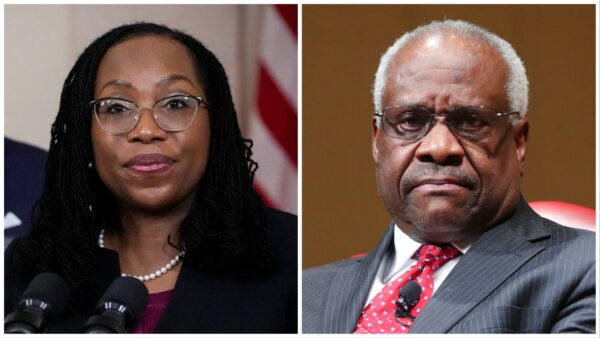The only two Black justices on the Supreme Court of the United States came to supremely different conclusions on the end of a decades-long statute that will affect how colleges and universities admit students of color for years to come.
Justices Ketanji Brown Jackson and Clarence Thomas released their opinions on the court decision issued on Thursday, June 29, that effectively retires longtime affirmative action policies in college admissions, which means higher education institutions can no longer take race into consideration as a specific basis of admission.

The court’s conservative majority ruled in Students for Fair Admissions v. Harvard and Students for Fair Admissions v. University of North Carolina that the policy violates the Equal Protection Clause of the Constitution and is therefore unlawful. Students for Fair Admissions, a conservative activist group that challenges college admissions that use a racial component, had lost in lower federal courts with the two cases before Thursday’s ruling.
Chief Justice John Roberts expounded on the 6-3 conservative majority’s reasoning in the court’s opinion, stating that said that for too long universities have “concluded, wrongly, that the touchstone of an individual’s identity is not challenges bested, skills built, or lessons learned but the color of their skin. Our constitutional history does not tolerate that choice.”
Thomas has been gunning for the end of affirmative action since 1991, the beginning of his time on the country’s highest bench. In a separate, concurring opinion, he called the policies “rudderless, race-based preferences designed to ensure a particular racial mix in their entering classes.”
“The solution to our Nation’s racial problems thus cannot come from policies grounded in affirmative action or some other conception of equity. Racialism simply cannot be undone by different or more racialism,” Thomas wrote. “What, then, would be the endpoint of these affirmative action policies? Not racial harmony, integration, or equality under the law. Rather, these policies appear to be leading to a world in which everyone is defined by their skin color, demanding ever-increasing entitlements and preferences on that basis.”
Joining a dissenting opinion with Justices Sonia Sotomayor and Elena Kagan, Jackson said this decision is “truly a tragedy for us all.” She elaborated that the ruling is emblematic of a “let-them-eat-cake obliviousness” modeled by the court’s conservative majority, adding that “deeming race irrelevant in law does not make it so in life.”
“Although formal race-linked legal barriers are gone, race still matters to the lived experiences of all Americans in innumerable ways, and today’s ruling makes things worse, not better,” Jackson affirmed. “The best that can be said of the majority’s perspective is that it proceeds (ostrich-like) from the hope that preventing consideration of race will end in racism. But if that is its motivation, the majority proceeds in vain.”
Thomas took the time to critique the conclusions Jackson drew from the court’s decision in his separate concurring opinion.
“Though Justice Jackson seems to think that her race-based theory can somehow benefit everyone, it is an immutable fact that “every time the government uses racial criteria to ‘bring the races together,’ someone gets excluded, and the person excluded suffers an injury solely because of his or her race,” Thomas stated.
Jackson had words for him in return.
“Justice Thomas ignites too many more straw men to list, or fully extinguish, here,” Jackson wrote. “The takeaway is that those who demand that no one think about race (a classic pink-elephant paradox) refuse to see, much less solve for, the elephant in the room – the race-linked disparities that continue to impede achievement of our great Nation’s full potential.”
The court’s decision was swiftly denunciated.
NAACP President and CEO Derrick Johnson stated the absence of affirmative action will drastically impact the admissions processes and hiring practices of colleges, universities, and employers across the U.S.
“Race plays an undeniable role in shaping the identities of and quality of life for Black Americans,” Johnson said in a statement. “In a society still scarred by the wounds of racial disparities, the Supreme Court has displayed a willful ignorance of our reality.”
President Joe Biden tweeted that he strongly disagrees with the decision and stressed that the country’s colleges are “stronger when they are racially diverse.”
Former President Donald Trump posted on his social platform, Truth Social, that “this is the ruling everyone was hoping and waiting for,” calling it a “great day for America.”


